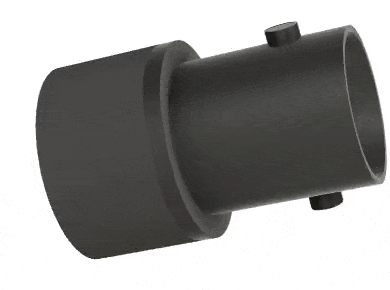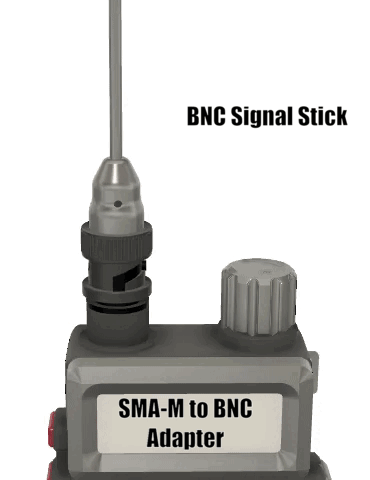FREE shipping in the US on orders over $50.
If it breaks, we will fix it.
Back to:Home Page | Our Products
SMA-M to BNC-F Adapter
See also:
Order today, ships in 1-2 weeks.
Most orders are shipped on the next business day.
Description
Conductivity Fix Video
This short video shows how to fix the conductivity issue with sandpaper:

This adapter is most commonly placed on a radio which requires an SMA-M antenna to allow the use of a BNC antenna on the radio.
Our SMA-M to BNC-F adapters have a rubber sheath on the SMA-M side which is specially designed to protrude just slightly below and assist with keeping out moisture and dirt. It fits well even on radios with a GPS antenna by the connector and the rubber sheath can be removed to make it fit even inset connectors which our SMA-M Signal Stick™ won’t fit!
Watch this animation to understand how it would be installed:

Common Questions
The easiest way is to email orders@signalstuff.com and we’ll answer as soon as we can.
Motorola radios can use a variety of antenna connector types, and unfortunately, we don’t have a practical way to support all of them.
Connector Compatibility
- If your Motorola radio uses a standard SMA connector, one of our Signal Sticks™ or adapters may fit. However, many Motorola radios use non-standard connectors that are not compatible with our products, even if they look nearly like a standard adapter.
What to Do If You’re Unsure
If you already know the connector type, we’re happy to help you find the right antenna or adapter. However, if you’re unsure which connector your Motorola radio uses, we likely won’t know either and won’t be able to assist further.
We recommend checking your radio’s documentation or reaching out to a Motorola-specific supplier to confirm the connector type. Your best bet is probably to find a BNC adapter which fits your radio and then you can use our BNC Signal Sticks.
If you have further questions, feel free to contact us at orders@signalstuff.com, and we’ll do our best to help where we can.
Yes, Signal Sticks™ can be used with many scanners, but there are a few things to keep in mind regarding performance and connector compatibility.
Frequency Performance
Any antenna will pick up signals on any frequency—the question is how well it will perform. Signal Sticks™ are tuned for the 2-meter and 70cm amateur radio bands, meaning they perform best within those ranges. As you move further from these frequencies, performance will diminish, but the Signal Stick™ can still work reasonably well for receiving signals on many other bands, particularly those close to the Amateur Radio bands it is tuned for.
For general scanner use, the dual-band Signal Stick™ is often the best choice since its longer length helps with broader frequency coverage. However, if you’re focusing on 220 MHz the 220 monoband antenna may be a better fit.
Connector Compatibility
Most scanners use BNC connectors, but this isn’t always the case. Be sure to verify the connector type on your scanner to ensure it matches the Signal Stick™ you order. If the connectors don’t match, you’ll need an adapter. Some scanners also have proprietary connectors which make it difficult or impossible to use an aftermarket antenna that isn’t specifically designed for that scanner.
Helpful Resources
Check out the product animations on our Signal Stick™ pages to see how the different connectors work. These visuals can help you determine the right antenna and adapter setup for your scanner.
In short, the Signal Stick™ will pick up signals across a wide range of frequencies, but performance will be best when the signal is close to the antenna’s tuned range.
Yes, Signal Sticks™ can physically connect to any radio with the right adapter or connector, but performance depends on how close the operating frequency is to the antenna’s tuning. Since Signal Sticks™ are optimized for the amateur radio bands (2 meters and 70cm), performance will diminish the further you move from these frequencies.
Here’s what to expect on other common bands:
- Aircraft band (VHF, below 2 meters): Performance will be reduced, as this band is significantly lower than the tuned range. It may still work, but it won’t be ideal.
- MURS (VHF) and Marine band (VHF): These bands are closer to the tuned frequencies, so the antenna should work reasonably well, though not perfectly.
- GMRS (UHF): Signal Sticks™ perform adequately on GMRS, though they won’t provide as much gain as some commercial antennas. However, they can handle more power, offering an advantage in certain situations. The gain should be similar on any antenna with a similar length (about 6 inches long), even the stock antenna if it isn’t shorter than that.
If you plan to operate on frequencies above the tuned range, you have the option of trimming the antenna slightly shorter for better performance. However, measuring SWR accurately can be tricky, as anything you do to measure SWR will itself affect the reading. We recommend doing signal strength tests instead.
Tip: It’s usually best to try the antenna “as-is” before cutting it as it may work fine without changes; also, remember that this only helps for frequencies above the intended range. If you decide to cut it, leave us a note in your order, and we’ll include a spare tip that you can glue on using epoxy or gel superglue.
If you ordered an antenna with the wrong connector, no problem! Just send it back in the original packaging to the following return address:
Signal Stuff
881 W State St Ste 140 PMB 203
Pleasant Grove, UT 84062
To avoid any kind of damage please ship the antenna in packaging which keeps it at least mostly straight, not coiled. A USPS flat rate envelope is fine, but is the most it should be bent during shipping. The original packaging is the easiest option if you still have it.
We recommend emailing us the tracking information at orders@signalstuff.com so we know to look out for it. This also helps in case the package gets lost or delayed in the mail, which we unfortunately see happen sometimes—especially with USPS shipments.
Please note:
- We will refund your order once we receive the return.
- Shipping costs will not be refunded since we cannot recover those costs.
The cheapest way to return the antenna is usually USPS First Class or USPS Ground Advantage.
On the Product page, you can select your radio’s make and model at the top of the page, and it will show you the antennas and adapters that fit it directly.
If you want to use an adapter, that may change things somewhat, depending on the configuration.
You can also use the SignalStuff Pick Tool to find the configurations that will work with your radio.